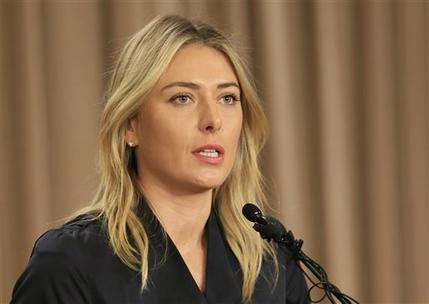-
Tips for becoming a good boxer - November 6, 2020
-
7 expert tips for making your hens night a memorable one - November 6, 2020
-
5 reasons to host your Christmas party on a cruise boat - November 6, 2020
-
What to do when you’re charged with a crime - November 6, 2020
-
Should you get one or multiple dogs? Here’s all you need to know - November 3, 2020
-
A Guide: How to Build Your Very Own Magic Mirror - February 14, 2019
-
Our Top Inspirational Baseball Stars - November 24, 2018
-
Five Tech Tools That Will Help You Turn Your Blog into a Business - November 24, 2018
-
How to Indulge on Vacation without Expanding Your Waist - November 9, 2018
-
5 Strategies for Businesses to Appeal to Today’s Increasingly Mobile-Crazed Customers - November 9, 2018
WADA agrees to relax rules on meldonium
Sharapova, who said she had been taking meldonium for more than a decade because of health problems, was banned by the International Tennis Federation (ITF) on March 12 after announcing she had failed a test at the Australian Open in Melbourne.
Advertisement
Positive tests for Meldonium, a heart medication manufactured and sold over-the-counter in Eastern Europe, are responsible for Maria Sharapova’s impending suspension and the Russian U18 hockey team pulling its entire roster out of competition the day before traveling to a tournament.
The World Anti-Doping Agency (WADA) has offered some of those, including a wave Russia’s top sportsmen and women, a lifeline: an amnesty for those with only a trace of the banned drug meldonium and able to prove that they “could not reasonably have known or suspected that the substance would still be present in his/her body on or after 1 January 2016, then a finding of no fault or negligence may be made”. The drug increases blood flow, which improves exercise capacity by carrying more oxygen to the muscles.
In a notice sent to national anti-doping agencies and global sports federations, WADA says “limited data exists” on the time it takes for meldonium to clear the system.
Kremlin spokesman Dmitry Peskov said Russian Federation is openly cooperating with worldwide sports organisations on doping-related investigations. “The issue that it deals with is the time this drug takes to come out of the system. In doing so, WADA has demonstrated impartiality and being objective in the fight against doping”.
WADA added meldonium, which was developed in Latvia, to the banned list after claiming there was evidence that it was being used for performance enhancing purposes.
Russian Tennis Federation president Shamil Tarpishchev said in a statement, “We really hope that Sharapova will still be allowed to take part in the Olympic Games”.
“We can confirm that the case is ongoing and that there will be a hearing”, ITF spokesman Nick Imison told the AP on Wednesday.
In a statement, athletes found to have less than 1 mcg of meldonium in doping tests carried out before March 1, 2016, may be allowed to compete again.
Advertisement
The agency said doping cases should be pursued, however, in the case of athletes who admit having taken meldonium on or after January 1.




























